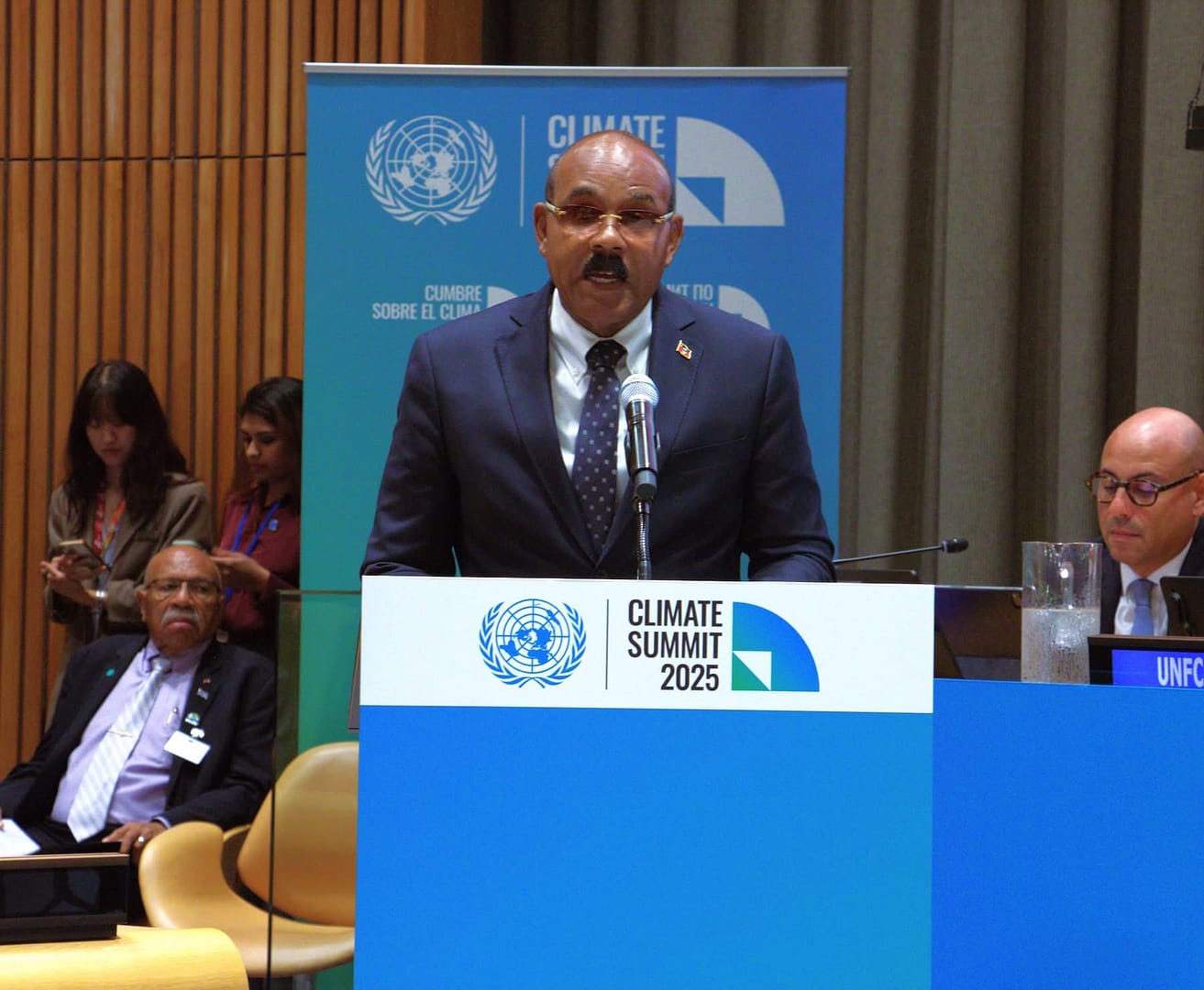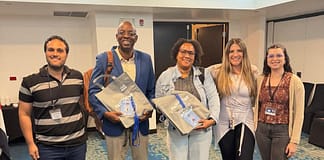
At Wednesday’s Special Event on Climate for Heads of State and Government (“Climate Summit”) held at the United Nations, Prime Minister the Honourable Gaston Browne delivered a powerful keynote calling for an enforceable, equitable transition from fossil fuels and demanding that those who have profited from fossil economies now bear responsibility to fund and enable climate justice.
Addressing world leaders and multilateral institutions, Prime Minister Browne underscored that global decarbonization is not optional—it is a matter of justice for Small Island Developing States (SIDS). He stressed that SIDS have disproportionately suffered the consequences of climate change—despite contributing the least to its causes—and thus require a system built on accountability.
He reaffirmed Antigua and Barbuda’s endorsement of the Fossil Fuel Treaty initiative, advocating a rules-based phase-out of coal, oil, and gas backed by strong finance and technology transfer channels.
Prime Minister Browne warned that climate change acts as a threat multiplier, worsening vulnerabilities across agriculture, fisheries, infrastructure, and livelihoods—with loss and damage already a daily reality for many small states.
He affirmed that maintaining the 1.5 °C threshold is non-negotiable for survival of island states, calling it a binding scientific, moral, and legal benchmark—not a bargaining chip.
Prime Minister Browne also took aim at the global financial architecture, noting that the world’s largest polluters must pay—not through charity, but through polluter pays mechanisms—to correct the systemic inequities that have left vulnerable states to absorb the costs.
He outlined that current climate finance—especially for adaptation, resilience, and loss and damage—remains woefully inadequate, while multilateral and international financial institutions (IFIs) are insufficiently responsive or effective.
He stated that the cost of adaptation is projected to reach US$387 billion annually by 2030, with loss and damage already manifesting in the hundreds of billions—yet new funding remains scarce.
Turning to national strategy, Prime Minister Browne reaffirmed that Antigua and Barbuda’s National Adaptation Plan (NAP) lays out a clear roadmap for resilience, and pledged that the country’s updated Nationally Determined Contribution (NDC) will further accelerate its green, resilient transformation. Antigua and Barbuda’s NAP is designed to prioritize adaptive measures across critical sectors, backed by data, risk mapping, and institutional strengthening.
He called on fellow leaders, finance institutions, development partners, and the private sector to act now: “Let us treat the 1.5 °C limit as a lifeline—not a line in the sand. Let us make the polluter-pays principle the foundation of a fair transition. And let us act—not tomorrow, but today—so the smallest and most vulnerable nations among us are not left to face the greatest storms alone.” (Ends)
Advertise with the mоѕt vіѕіtеd nеwѕ ѕіtе іn Antigua!
We offer fully customizable and flexible digital marketing packages.
Contact us at [email protected]















This is being referred to as a powerful keynote
Presentation. WOW! And powerful it is.
The national strategy, Prime Minister Browne spoke of regarding Antigua and Barbuda’s National Adaptation Plan (NAP) which he states lays out a clear roadmap for resilience, and pledged that the country’s updated Nationally Determined Contribution (NDC).
What he promotes to the world as existing, are unknown among the Antiguan and Barbudan public.
Does The Prime Minister thinks when he talks of further acceleration of green, resilient transformation in Antigua and Barbuda which is a lie, other heads of state of will come to his aid?
Not likely.
He says: Antigua and Barbuda’s NAP is designed to prioritize adaptive measures across critical sectors, backed by data, risk mapping, and institutional strengthening. Where is it? Where is it being practiced.
What is powerfully about Browne’s presentation is the level of its hypocrisy.
Gaston goes before the UN and lecture them about fossil fuel when Antigua and Barbuda promotes fossil fuel consumption.
Where and when has Gaston Browne promote alternative fuels at home?
Where are the comprehensive series of legislation (Acts) or regulations that promotes renewable energy?
At the end of the day; this is a Hail Mary for debt reduction. Most of the Antigua and Barbuda sovereign debt has been passed to private investors.
But like Donald Trump, even when he is lies on the international stage; he and his people are ready to fight back and take punitive actions.
I urge you as prime minister to pay me some money for climate change, because I don’t mess with the mangrove and swamps, no investors can touch them.under my watch as prime minister.
Comments are closed.